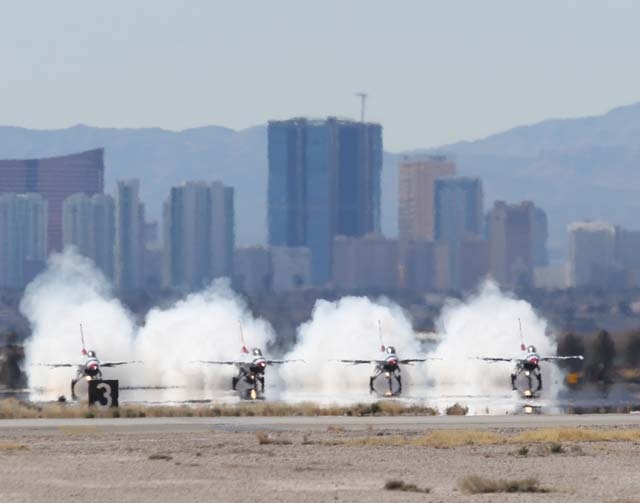Political turbulence in Washington grounds Thunderbirds shows

Sequestration and gridlock in Washington, D.C., have clipped the wings of the Nellis Air Force-based Thunderbirds, an aerial demonstration team that has mesmerized airplane lovers for years while boosting local economies in virtually all the towns it visits.
After a show in Titusville, Fla., on March 23 and 24, all its shows will be canceled indefinitely from April 1 .
That includes stints in countries such as the Dominican Republic and U.S. cities such as Fort Lauderdale, Fla.; Rochester, N.Y.; Battle Creek, Mich.; Dayton, Ohio; Myrtle Beach, S.C.; Cheyenne, Wyo.; and Rome, Ga. — and plenty of other points in between.
If the Thunderbirds schedule sounds a bit like that of a rock band, the comparison isn’t too far off.
The F-16s fly in extremely tight formations — a half a dozen planes at a time. They go as fast as 500 mph, although they’re capable of traveling twice the speed of sound. They’ve always been a top ticket item in Nevada, around the country and around the world.
In short, they represent heavy hitting U.S. air power.
Not since 1982 has there been such a disturbance to their shows. That was when the team was in the midst of switching from the T-38 Talon to the F-16 Fighting Falcon.
But it was never to this extent, noted Darrick Lee, a spokesman for the Thunderbirds team.
“We saw it coming,” Lee said of the canceled shows in a telephone interview Saturday. “We were prepared.”
The turbulence is just the latest drama in the controversial sequestration — across-the-board budget cuts approved by Congress and President Barack Obama in 2011 that have defied last-minute efforts to reverse them.
But the show-won’t-go-on announcement, issued in a news release over the weekend by secretary of the Air Force, is one of the most visible local examples of what the standoff in the nation’s capital is causing.
The impact on the Southern Nevada economy will be significant.
According to the American Airpower Foundation, the annual Aviation Nation air show in Las Vegas generated an estimated $19.2 million in economic impact in 2012 based on 135,000 attendees.
While some feel that the $85 billion in automatic, across-the-board federal spending cuts are a good thing, others have said the cutbacks could have been more carefully targeted.
Those who fear the worst say the sequestration cuts could usher in larger classroom sizes in Nevada, furlough about 1,500 civilians at Nellis, and bring about longer lines at McCarran International Airport due to Transportation Security Administration furloughs.
One of the critics is Nevada Rep. Dina Titus, a Democrat.
“Every day, households across Southern Nevada balance their budgets by prioritizing needs and making compromises among family members,” she wrote in a Review-Journal opinion piece last week. “If they are short of money, they don’t cut food, medicine and movies all by the same amount; they pay for necessities and cut out what can be spared during hard times.
If the Democratic-controlled Senate and Republican-controlled House don’t agree to handle things differently, Thunderbirds fans might have to do without their own aerial demonstration team and the thrills and patriotic fervor it brings out in people.
One thing is for certain: Las Vegas residents and visitors will still see Thunderbirds in the local skies from time to time. Even though they might not be performing in shows, the eight pilots who make up the team still have to keep up their qualifications and hours in the air.
They’ll also be busy on the ground, where they plan to campaign hard across Nevada to keep the Thunderbirds alive.
“We’re going to spread our people throughout the Las Vegas community and tell the Air Force story in any way we can,” said Tech. Sgt. Jake A. Richmond, with base public affairs.
Review-Journal writer Keith Rogers contributed to this report. Contact reporter Tom Ragan at tragan@reviewjournal.com or 702-224-5512.